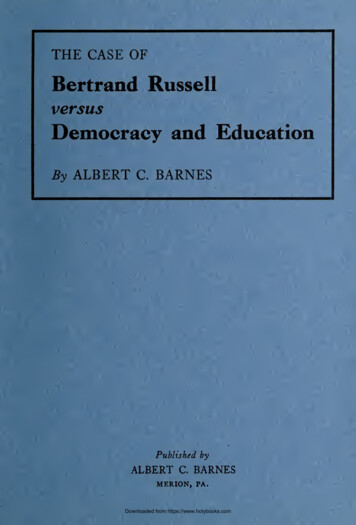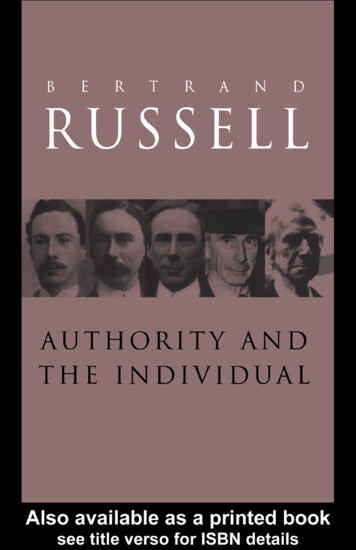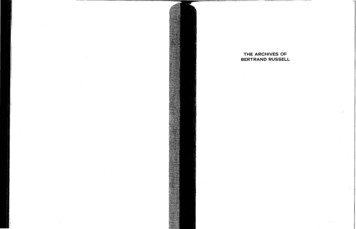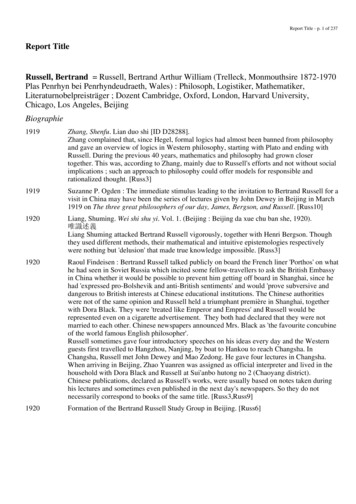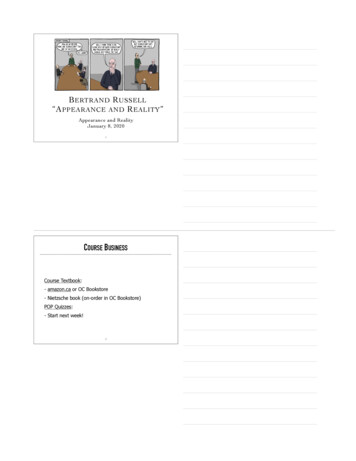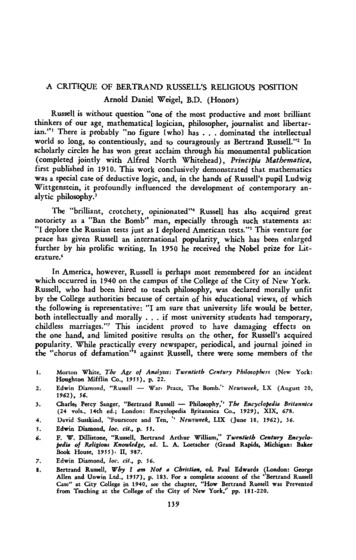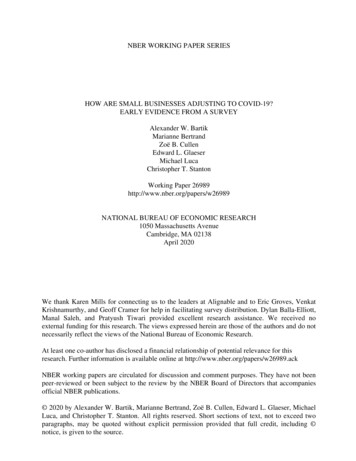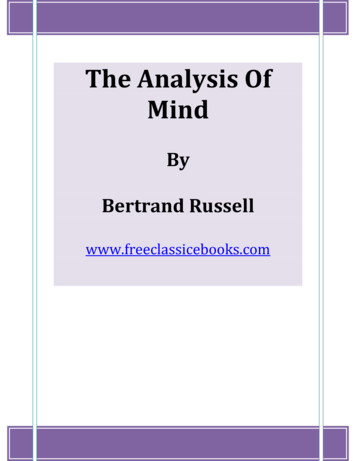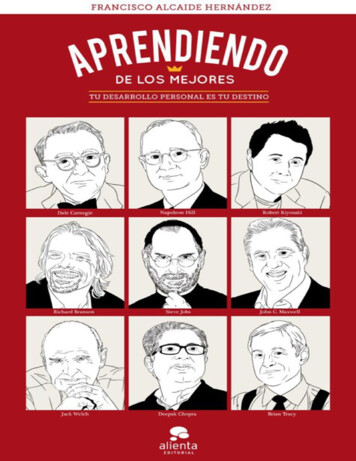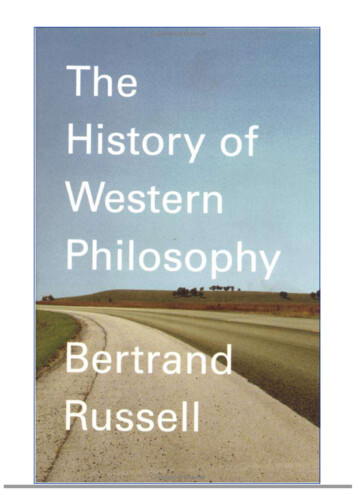
Transcription
BERTRAND RUSSELLA HISTORY OF WESTERN PHILOSOPHY And Its Connection with Political and SocialCircumstances from the Earliest Times to the Present DaySIMON AND SCHUSTER, NEW YORKALL RIGHTS RESERVED INCLUDING THE RIGHT OF REPRODUCTION IN WHOLE ORIN PART IN ANY FORM COPYRIGHT, 1945 , BY BERTRAND RUSSELL PUBLISHED BYSIMON AND SCHUSTER, INC. ROCKEFELLER CENTER, 1230 SIXTH AVENUE NEWYORK 20, N. Y.Fourth PrintingMANUFACTURED IN THE UNITED STATES OF AMERICA BY AMERICAN BOOKSTRATFORD PRESS, INC., N. Y.TABLE OF CONTENTSPreface by AuthorixIntroduction xiii
BOOK ONE. ANCIENT PHILOSOPHYPart I. The Pre-Socratics3Chapter I. The Rise of Greek Civilization3Chapter II. The Milesian School24Chapter III. Pythagoras29Chapter IV. Heraclitus38Chapter V. Parmenides48Chapter VI. Empedocles53Chapter VII. Athens in Relation to Culture58Chapter VIII. Anaxagoras61Chapter IX. The Atomists64Chapter X. Protagoras73Part II. Socrates, Plato, and Aristotle82Chapter XI. Socrates82Chapter XII. The Influence of Sparta94Chapter XIII. The Sources of Plato's Opinions
Chapter XXIII. Aristotle's Physics203Chapter XXIV. Early Greek Mathematics and Astronomy208Part III. Ancient Philosophy after Aristotle218Chapter XXV. The Hellenistic World218Chapter XXVI. Cynics and Sceptics228Chapter XXVII. The Epicureans240Chapter XXIX. Stoicism252Chapter XXIX. The Roman Empire in Relation to Culture270Chapter XXX. Plotinus284
BOOK TWO. CATHOLIC PHILOSOPHYIntroduction301Part I. The Fathers308Chapter I. The Religious Development of the Jews 308Chapter II. Christianity During the First Four Centuries324Chapter III. Three Doctors of the Church334Chapter IV. Saint Augustine's Philosophy and Theology352Chapter V. The Fifth and Sixth Centuries366Chapter VI. Saint Benedict and Gregory the Great375Part II. The Schoolmen388Chapter VII. The Papacy in the Dark Ages388Chapter VIII. John the Scot400Chapter IX. Ecclesiastical Reform in the Eleventh Century407Chapter X. Mohammedan Culture and Philosophy419-vi-
Chapter XI. The Twelfth Century428Chapter XII. The Thirteenth Century441Chapter XIII. Saint Thomas Aquinas452Chapter XIV. Franciscan Schoolmen463Chapter XV. The Eclipse of the Papacy476
BOOK THREE. MODERN PHILOSOPHYPart I. From the Renaissance to Hume491Chapter I. General Characteristics491Chapter II. The Italian Renaissance495Chapter III. Machiavelli504Chapter IV. Erasmus and More512Chapter V. The Reformation and CounterReformation522Chapter VI. The Rise of Science525Chapter VII. Francis Bacon541Chapter VIII. Hobbes's Leviathan546Chapter IX. Descartes557Chapter X. Spinoza569Chapter XI. Leibniz581Chapter XII. Philosophical Liberalism596Chapter XIII. Locke's Theory of Knowledge604Chapter XIV. Locke's Political Philosophy
Chapter XXIV. Schopenhauer753Chapter XXV. Nietzsche760Chapter XXVI. The Utilitarians773Chapter XXVII. Karl Marx782Chapter XXVIII. Bergson791Chapter XXIX. William James811Chapter XXX. John Dewey819Chapter XXXI. The Philosophy of Logical Analysis828Index837
PREFACEMANY histories of philosophy exist, and it has not been my purpose merely to add one to theirnumber. My purpose is to exhibit philosophy as an integral part of social and political life: not asthe isolated speculations of remarkable individuals, but as both an effect and a cause of thecharacter of the various communities in which different systems flourished. This purposedemands more account of general history than is usually given by historians of philosophy. I havefound this particularly necessary as regards periods with which the general reader cannot beassumed to be familiar. The great age of the scholastic philosophy was an outcome of the reformsof the eleventh century, and these, in turn, were a reaction against previous corruption. Withoutsome knowledge of the centuries between the fall of Rome and the rise of the medieval Papacy,the intellectual atmosphere of the twelfth and thirteenth centuries can hardly be understood. Indealing with this period, as with others, I have aimed at giving only so much general history as Ithought necessary for the sympathetic comprehension of philosophers in relation to the times thatformed them and the times that they helped to form.One consequence of this point of view is that the importance which it gives to a philosopher isoften not that which he deserves on account of his philosophic merit. For my part, for example, Iconsider Spinoza a greater philosopher than Locke, but he was far less influential; I havetherefore treated him much more briefly than Locke. Some men--for example, Rousseau andByron-though not philosophers at all in the academic sense, have so profoundly affected theprevailing philosophic temper that the development of philosophy cannot be understood if theyareignored. Even pure men of action are sometimes of great importance in this respect; very fewphilosophers have influenced philosophy as much as Alexander the Great, Charlemagne, orNapoleon. Lycurgus, if only be had existed, would have been a still more notable example.In attempting to cover such a vast stretch of time, it is necessary to have very drastic principles ofselection. I have come to the conclusion, from reading standard histories of philosophy, that veryshort accounts convey nothing of value to the reader; I have therefore omitted altogether (withfew exceptions) men who did not seem to me to deserve a fairly full treatment. In the case of themen whom I have discussed, I have mentioned what seemed relevant as regards their lives andtheir social surroundings; I have even sometimes recorded intrinsically unimportant details whenI considered them illustrative of a man or of his times.Finally, I owe a word of explanation and apology to specialists on any part of my enormoussubject. It is obviously impossible to know as much about every philosopher as can be knownabout him by a man whose field is less wide; I have no doubt that every single philosopher whomI have mentioned, with the exception of Leibniz, is better known to many men than to me. If,however, this were considered a sufficient reason for respectful silence, it would follow that noman should undertake to treat of more than some narrow strip of history. The influence of Spartaon Rousseau, of Plato on Christian philosophy until the thirteenth century, of the Nestorians onthe Arabs and thence on Aquinas, of Saint Ambrose on liberal political philosophy from the riseof the Lombard cities until the present day, are some among the themes of which only acomprehensive history can treat. On such grounds I ask the indulgence of those readers who findmy knowledge of
this or that portion of my subject less adequate than it would have been if there bad been no needto remember "time's winged chariot."This book owes its existence to Dr. Albert C. Barnes, having been originally designed and partlydelivered as lectures at the Barnes Foundation in Pennsylvania.As in most of my work during the last thirteen years, I have been greatly assisted, in research andin many other ways, by my wife, Patricia Russell.BERTRAND RUSSELLINTRODUCTIONTHE conceptions of life and the world which we call "philosophical" are a product of two factors:one, inherited religious and ethical conceptions; the other, the sort of investigation which may becalled "scientific," using this word in its broadest sense. Individual philosophers have differedwidely in regard to the proportions in which these two factors entered into their systems, but it isthe presence of both, in some degree, that characterizes philosophy."Philosophy" is a word which has been used in many ways, some wider, some narrower. I proposeto use it in a very wide sense, which I will now try to explain.Philosophy, as I shall understand the word, is something intermediate between theology andscience. Like theology, it consists of speculations on matters as to which definite knowledge has,so far, been unascertainable; but like science, it appeals to human reason rather than to authority,whether that of tradition or that of revelation. All definite knowledge--so I should contend-belongs to science; all dogma as to what surpasses definite knowledge belongs to theology. Butbetween theology and science there is a No Man's Land, exposed to attack from both sides; thisNo Man's Land is philosophy. Almost all the questions of most interest to speculative minds aresuch as science cannot answer, and the confident answers of theologians no longer seem soconvincing as they did in former centuries. Is the world divided into mind and matter, and, if so,what is mind and what is matter? Is mind subject to matter, or is it possessed of independentpowers? Has the universe any unity or purpose? Is it evolving towards some goal? Are there reallylaws of nature, or do we believe in them only because of our innate love of order? Is man what heseems to the astronomer, a tiny lump of impure carbon and water impotently crawling on a smalland unimportant planet? Or is he what he appears to Hamlet? Is he perhaps both at once? Is therea way of living that is noble and another that is base, or are all ways of living merely futile? Ifthere is a way of living that is noble, in what does it consist, and how shall we achieve it? Mustthe good be eternal in order to deserve to be valued, or is it worth seeking even if the uni
verse is inexorably moving towards death? Is there such a thing as wisdom, or is what seems suchmerely the ultimate refinement of folly? To such questions no answer can be found in thelaboratory. Theologies have professed to give answers, all too definite; but their very definitenesscauses modern minds to view them with suspicion. The studying of these questions, if not theanswering of them, is the business of philosophy.Why, then, you may ask, waste time on such insoluble problems? To this one may answer as ahistorian, or as an individual facing the terror of cosmic loneliness.The answer of the historian, in so far as I am capable of giving it, will appear in the course of thiswork. Ever since men became capable of free speculation, their actions, in innumerable importantrespects, have depended upon their theories as to the world and human life, as to what is good andwhat is evil. This is as true in the present day as at any former time. To understand an age or anation, we must understand its philosophy, and to understand its philosophy we must ourselves bein some degree philosophers. There is here a reciprocal causation: the circumstances of men'slives do much to determine their philosophy, but, conversely, their philosophy does much todetermine their circumstances. This interaction throughout the centuries will be the topic of thefollowing pages.There is also, however, a more personal answer. Science tells us what we can know, but what wecan know is little, and if we forget how much we cannot know we become insensitive to manythings of very great importance. Theology, on the other hand, induces a dogmatic belief that wehave knowledge where in fact we have ignorance, and by doing so generates a kind of impertinentinsolence towards the universe. Uncertainty, in the presence of vivid hopes and fears, is painful,but must be endured if we wish to live without the support of comforting fairy tales. It is not goodeither to forget the questions that philosophy asks, or to persuade ourselves that we have foundindubitable answers to them. To teach how to live without certainty, and yet without beingparalyzed by hesitation, is perhaps the chief thing that philosophy, in our age, can still do for thosewho study it.Philosophy, as distinct from theology, began in Greece in the sixth century B.C. After running itscourse in antiquity, it was again submerged by theology as Christianity rose and Rome fell. Itssecond
great period, from the eleventh to the fourteenth centuries, was dominated by the Catholic Church,except for a few great rebels, such as the Emperor Frederick II ( 1195-1250). This period wasbrought to an end by the confusions that culminated in the Reformation. The third period, fromthe seventeenth century to the present day, is dominated, more than either of its predecessors, byscience; traditional religious beliefs remain important, but are felt to need justification, and aremodified wherever science seems to make this imperative. Few of the philosophers of this periodare orthodox from a Catholic standpoint, and the secular State is more important in theirspeculations than the Church.Social cohesion and individual liberty, like religion and science, are in a state of conflict or uneasycompromise throughout the whole period. In Greece, social cohesion was secured by loyalty to theCity State; even Aristotle, though in his time Alexander was making the City State obsolete, couldsee no merit in any other kind of polity. The degree to which the individual's liberty was curtailedby his duty to the City varied widely. In Sparta he had as little liberty as in modern Germany orRussia; in Athens, in spite of occasional persecutions, citizens had, in the best period, a veryextraordinary freedom from restrictions imposed by the State. Greek thought down to Aristotle isdominated by religious and patriotic devotion to the City; its ethical systems are adapted to thelives of citizens and have a large political element. When the Greeks became subject, first to theMacedonians, and then to the Romans, the conceptions appropriate to their days of independencewere no longer applicable. This produced, on the one hand, a loss of vigour through the breachwith tradition, and, on the other hand, a more individual and less social ethic. The Stoics thoughtof the virtuous life as a relation of the soul to God, rather than as a relation of the citizen to theState. They thus prepared the way for Christianity, which, like Stoicism, was originallyunpolitical, since, during its first three centuries, its adherents were devoid of influence ongovernment. Social cohesion, during the six and a half centuries from Alexander to Constantine,was secured, not by philosophy and not by ancient loyalties, but by force, first that of armies andthen that of civil administration. Roman armies, Roman roads, Roman law, and Roman officialsfirst created and then preserved
a powerful centralized State. Nothing was attributable to Roman philosophy, since there wasnone.During this long period, the Greek ideas inherited from the age of freedom underwent a gradualprocess of transformation. Some of the old ideas, notably those which we should regard asspecifically religious, gained in relative importance; others, more rationalistic, were discardedbecause they no longer suited the spirit of the age. In this way the later pagans trimmed theGreek tradition until it became suitable for incorporation in Christian doctrine.Christianity popularized an important opinion, already implicit in the teaching of the Stoics, butforeign to the general spirit of antiquity --I mean, the opinion that a man's duty to God is moreimperative than his duty to the State. This opinion--that "we ought to obey God rather thanMan," as Socrates and the Apostles said--survived the conversion of Constantine, because theearly Christian emperors were Arians or inclined to Arianism. When the emperors becameorthodox, it fell into abeyance. In the Byzantine Empire it remained latent, as also in thesubsequent Russian Empire, which derived its Christianity from Constantinople. * But in theWest, where the Catholic emperors were almost immediately replaced (except, in parts of Gaul)by heretical barbarian conquerors, the superiority of religious to political allegiance survived,and to some extent still survives.The barbarian invasion put an end, for six centuries, to the civilization of western Europe. Itlingered in Ireland until the Danes destroyed it in the ninth century; before its extinction there itproduced one notable figure, Scotus Erigena. In the Eastern Empire, Greek civilization, in adesiccated form, survived, as in a museum, till the fall of Constantinople in 1453, but nothingof importance to the world came out of Constantinople except an artistic tradition andJustinian's Codes of Roman law.During the period of darkness, from the end of the fifth century to the middle of the eleventh,the western Roman world underwent some very interesting changes. The conflict between dutyto God and duty to the State, which Christianity had introduced, took the form of a conflictbetween Church and king. The ecclesiastical jurisdiction of the Pope extended over Italy,France, and Spain, Great* That is why the modern Russian does not think that we ought to obey dialecticalmaterialism rather than Stalin.
Britain and Ireland, Germany, Scandinavia, and Poland. At first, outside Italy and southern France,his control over bishops and abbots was very slight, but from the time of Gregory VII (lateeleventh century) it became real and effective. From that time on, the clergy, throughout westernEurope, formed a single organization directed from Rome, seeking power intelligently andrelentlessly, and usually victorious, until after the year 1300, in their conflicts with secular rulers.The conflict between Church and State was not only a conflict between clergy and laity; it wasalso a renewal of the conflict between the Mediterranean world and the northern barbarians. Theunity of the Church echoed the unity of the Roman Empire; its liturgy was Latin, and its dominantmen were mostly Italian, Spanish, or southern French. Their education, when education revived,was classical; their conceptions of law and government would have been more intelligible toMarcus Aurelius than they were to contemporary monarchs. The Church represented at oncecontinuity with the past and what was most civilized in the present.The secular power, on the contrary, was in the hands of kings and barons of Teutonic descent,who endeavoured to preserve what they could of the institutions that they had brought out of theforests of Germany. Absolute power was alien to those institutions, and so was what appeared tothese vigorous conquerors as a dull and spiritless legality. The king had to share his power withthe feudal aristocracy, but all alike expected to be allowed occasional outbursts of passion in theform of war, murder, pillage, or rape. Monarchs might repent, for they were sincerely pious, and,after all, repentance was itself a form of passion. But the Church could never produce in them thequiet regularity of good behaviour which a modern employer demands, and usually obtains, of hisemployees. What was the use of conquering the world if they could not drink and murder and loveas the spirit moved them? And why should they, with their armies of proud knights, submit to theorders of bookish men, vowed to celibacy and destitute of armed force? In spite of ecclesiasticaldisapproval, they preserved the duel and trial by battle, and they developed tournaments andcourtly love. Occasionally, in a fit of rage, they would even murder eminent churchmen.All the armed force was on the side of the kings, and yet the Church was victorious. The Churchwon, partly because it had almost a
monopoly of education, partly because the kings were perpetually at war with each other, butmainly because, with very few exceptions, rulers and people alike profoundly believed that theChurch possessed the power of the keys. The Church could decide whether a king should spendeternity in heaven or in hell; the Church could absolve subjects from the duty of allegiance, and sostimulate rebellion. The Church, moreover, represented order in place of anarchy, andconsequently won the support of the rising mercantile class. In Italy, especially, this lastconsideration was decisive.The Teutonic attempt to preserve at least a partial independence of the Church expressed itself notonly in politics, but also in art, romance, chivalry, and war. It expressed itself very little in theintellectual world, because education was almost wholly confined to the clergy. The explicitphilosophy of the Middle Ages is not an accurate mirror of the times, but only of what wasthought by one party. Among ecclesiastics, however--especially among the Franciscan friars --acertain number, for various reasons, were at variance with the Pope. In Italy, moreover, culturespread to the laity some centuries sooner than it did north of the Alps. Frederick II, who tried tofound a new religion, represents the extreme of anti-papal culture; Thomas Aquinas, who wasborn in the kingdom of Naples where Frederick II was supreme, remains to this day the classicexponent of papal philosophy. Dante, some fifty years later, achieved a synthesis, and gave theonly balanced exposition of the complete medieval world of ideas.After Dante, both for political and for intellectual reasons, the medieval philosophical synthesisbroke down. It had, while it lasted, a quality of tidiness and miniature completeness; whatever thesystem took account of was placed with precision with relation to the other contents of its veryfinite cosmos. But the Great Schism, the conciliar movement, and the Renaissance papacy led upto the Refformation, which destroyed the unity of Christendom and the scholastic theory ofgovernment that centered round the Pope. In the Renaissance period new knowledge, both ofantiquity and of the earth's surface, made men tired of systems, which were felt to be mentalprisons. The Copernican astronomy assigned to the earth and to man a humbler position than theyhad enjoyed in the Ptolemaic theory. Pleasure in new facts took the place, among intelligent men.
of pleasure in reasoning, analysing, and systematizing. Although in art the Renaissance is stillorderly, in thought it prefers a large and fruitful disorder. In this respect, Montaigne is the mosttypical exponent of the age.In the theory of politics, as in everything except art, there was a collapse of order. The MiddleAges, though turbulent in practice, were dominated in thought by a passion for legality and by avery precise theory of political power. All power is ultimately from God; He has delegated powerto the Pope in sacred things and to the Emperor in secular matters. But Pope and Emperor alikelost their importance during the fifteenth century. The Pope became merely one of the Italianprinces, engaged in the incredibly complicated and unscrupulous game of Italian power politics.The new national monarchies in France, Spain, and England had, in their own territories, a powerwith which neither Pope nor Emperor could interfere. The national State, largely owing togunpowder, acquired an influence over men's thoughts and feelings which it had not had before,and which progressively destroyed what remained of the Roman belief in the unity of civilization.This political disorder found expression in Machiavelli Prince. In the absence of any guidingprinciple, politics becomes a naked struggle for power; The Prince gives shrewd advice as to howto play this game successfully. What had happened in the great age of Greece happened again inRenaissance Italy: traditional moral restraints disappeared, because they were seen to beassociated with superstition; the liberation from fetters made individuals energetic and creative,producing a rare florescence of genius; but the anarchy and treachery which inevitably resultedfrom the decay of morals made Italians collectively impotent, and they fell, like the Greeks, underthe domination of nations less civilized than themselves but not so destitute of social cohesion.The result, however, was less disastrous than in the case of Greece, because the newly powerfulnations, with the exception of Spain, showed themselves as capable of great achievement as theItalians had been.From the sixteenth century onward, the history of European thought is dominated by theReformation. The Reformation was a complex many-sided movement, and owed its success to avariety of
causes. In the main, it was a revolt of the northern nations against the renewed dominion of Rome.Religion was the force that had subdued the North, but religion in Italy had decayed: the papacyremained as an institution, and extracted a huge tribute from Germany and England, but thesenations, which were still pious, could feel no reverence for the Borgias and Medicis, whoprofessed to save souls from purgatory in return for cash which they squandered on luxury andimmorality. National motives, economic motives, and moral motives all combined to strengthenthe revolt against Rome. Moreover the Princes soon perceived that, if the Church in theirterritories became merely national, they would be able to dominate it, and would thus becomemuch more powerful at home than they had been while sharing dominion with the Pope. For allthese reasons, Luther's theological innovations were welcomed by rulers and peoples alikethroughout the greater part of northern Europe.The Catholic Church was derived from three sources. Its sacred history was Jewish, its theologywas Greek, its government and canon law were, at least indirectly, Roman. The Reformationrejected the Roman elements, softened the Greek elements, and greatly strengthened the Judaicelements. It thus co-operated with the nationalist forces which were undoing the work of socialcohesion which had been effected first by the Roman Empire and then by the Roman Church. InCatholic doctrine, divine revelation did not end with the scriptures, but continued from age to agethrough the medium of the Church, to which, therefore, it was the duty of the individual to submithis private opinions. Protestants, on the contrary, rejected the Church as a vehicle of revelation;truth was to be sought only in the Bible, which each man could interpret for himself. If mendiffered in their interpretation, there was no divinely appointed authority to decide the dispute. Inpractice, the State claimed the right that had formerly belonged to the Church, but this was ausurpation. In Protestant theory, there should be no earthly intermediary between the soul andGod.The effects of this change were momentous. Truth was no longer to be ascertained by consultingauthority, but by inward meditation. There was a tendency, quickly developed, towards anarchismin politics, and, in religion, towards mysticism, which had always fitted with difficulty into theframework of Catholic orthodoxy. There
came to be not one Protestantism, but a multitude of sects; not one philosophy opposed toscholasticism, but as many as there were philosophers; not, as in the thirteenth century, oneEmperor opposed to the Pope, but a large number of heretical kings. The result, in thought as inliterature, was a continually deepening subjectivism, operating at first as a wholesome liberationfrom spiritual slavery, but advancing steadily towards a personal isolation inimical to socialsanity.Modern philosophy begins with Descartes, whose fundamental certainty is the existence ofhimself and his thoughts, from which the external world is to be inferred. This was only the firststage in a development, through Berkeley and Kant, to Fichte, for whom everything is only anemanation of the ego. This was insanity, and, from this extreme, philosophy has been attempting,ever since, to escape into the world of every-day common sense.With subjectivism in philosophy, anarchism in politics goes hand in hand. Already during Luther'slifetime, unwelcome and unacknowledged disciples had developed the doctrine of Anabaptisn,which, for a time, dominated the city of Münster. The Anabaptists repudiated all law, since theyheld that the good man will be guided at every moment by the Holy Spirit, who cannot be boundby formulas. From this premiss they arrive at communism and sexual promiscuity; they weretherefore exterminated after a heroic resistance. But their doctrine, in softened forms, spread toHolland, England and America; historically, it is the source of Quakerism. A fiercer form ofanarchism, no longer connected with religion, arose in the nineteenth century. In Russia, in Spain,and to a lesser degree in Italy, it had considerable success, and to this day it remains a bugbear ofthe American immigration authorities. This modern form, though anti-religious, has still much ofthe spirit of early Protestantism; it differs mainly in directing against secular governments thehostility that Luther directed against popes.Subjectivity, once let loose, could not be confined within limits until it had run its course. Inmorals, the Protestant emphasis on the individual conscience was essentially anarchic. Habit andcustom were so strong that, except in occasional outbreaks such as that of Munster, the disciplesof individualism in ethics continued to act in a manner which was conventionally virtuous. Butthis was a precarious equilibrium. The eighteenth-century cult of "sensibility" began to break itdown: an act was admired, not for its good consequences, or for its
conformity to a moral code, but for the emotion that inspired it. Out of this attitude developed thecult of the hero, as it is expressed by Carlyle and Nietzsche, and the Byronic cult of violentpassion of no matter what kind.The romantic movement, in art, in literature, and in politics, is bound up with this subjective wayof judging men, not as members of a community, but as aesthetically delightful objects ofcontemplation. Tigers are more beautiful than sheep, but we prefer them behind bars. The typicalromantic removes the bars and enjoys the magnificent leaps with which the tiger annihilates thesheep. He exhorts men to imagine themselves tigers, and when he succeeds the results are notwholly pleasant.Against the more insane forms of subjectivism in modern times there have been various reactions.First, a half-way compromise philosophy, the doctrine of liberalism, which attempted to assign therespective spheres of government and the individual. This begins, in its modern form, with Locke,who is as much opposed to "enthusiasm"--the individualism of
BOOK ONE. ANCIENT PHILOSOPHY Part I. The Pre-Socratics 3 Chapter I. The Rise of Greek Civilization 3 Chapter II. The Milesian School 24 Chapter III. Pythagoras 29 Chapter IV. Heraclitus 38 Chapter V. Parmenides 48 Chapter VI. Empedocles 53 Chapter VII. Athens in Relation to Culture 5
